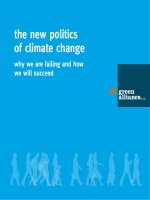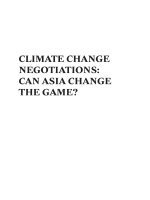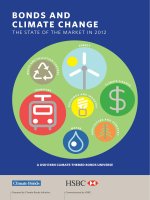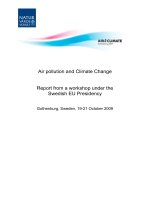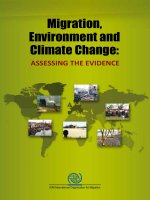Surviving Climate Change The Struggle to Avert Global Catastrophe
Bạn đang xem bản rút gọn của tài liệu. Xem và tải ngay bản đầy đủ của tài liệu tại đây (2.41 MB, 301 trang )
Surviving Climate Change
The Struggle to Avert Global Catastrophe
Edited by
DAVID CROMWELL
and
MARK LEVENE
Pluto
P
Press
LONDON • ANN ARBOR, MI
in association with
Crisis Forum
Cromwell 00 pre iii
24/8/07 15:36:39
First published 2007 by Pluto Press
345 Archway Road, London N6 5AA
and 839 Greene Street, Ann Arbor, MI 48106
www.plutobooks.com
Copyright © David Cromwell and Mark Levene 2007
The right of the individual contributors to be identified as the authors
of this work has been asserted by them in accordance with the Copyright,
Designs and Patents Act 1988.
British Library Cataloguing in Publication Data
A catalogue record for this book is available from the British Library
Hardback
ISBN-13 978 0 7453 2568 2
ISBN-10 0 7453 2568 8
Paperback
ISBN-13 978 0 7453 2567 5
ISBN-10 0 7453 2567 X
Library of Congress Cataloging in Publication Data applied for
This book is printed on paper suitable for recycling and made from fully managed
and sustained forest sources. Logging, pulping and manufacturing processes are
expected to conform to the environmental regulations of the country of origin.
10
9
8
7
6
5
4
3
2
1
Designed and produced for Pluto Press by
Chase Publishing Services Ltd, Fortescue, Sidmouth, EX10 9QG, England
Typeset from disk by Stanford DTP Services, Northampton, England
Printed and bound in the European Union by
CPI Antony Rowe Ltd, Chippenham and Eastbourne, England
Cromwell 00 pre iv
24/8/07 15:36:40
In memory of John Theobald,
our friend and fellow campaigner
Cromwell 00 pre v
24/8/07 15:36:40
Contents
Preface
ix
Introduction: Survival Means Renewal
Mark Levene and David Cromwell
1
Part I: The Big Picture
1
The Case for Contraction and Convergence
Aubrey Meyer
29
Part II: The State and its Apparatus
2
Thinking the Worst: The Pentagon Report
Dave Webb
3
Preparing for Mass Refugee Flows: The Corporate
Military Sector
Steve Wright
82
Climate Change and the Political Process:
Consequences for Government Action in Britain
James Humphreys
102
4
59
Part III: Critical Players
5
6
7
8
First They Blocked, Now Do They Bluff?
Corporations Respond to Climate Change
Melanie Jarman
123
Mostly Missing the Point: Business Responses to
Climate Change
David Ballard
137
The Mass Media, Climate Change, and How Things
Might Be
John Theobald and Marianne McKiggan
158
Having the Information, but What Do You Then Do
With It? The Scientific and Academic Communities
Jonathan Ward
176
vii
Cromwell 00 pre vii
24/8/07 15:36:40
viii Surviving Climate Change
9
Asleep On Their Watch: Where Were the NGOs?
George Marshall
196
Part IV: The Challenge Ahead
10
Clearing the Pathways to Transformation
Susan Ballard and David Ballard
11
Averting Climate Change: The Need for Enlightened
Self-Interest
Jim Scott
Afterword: Where Do We Go From Here?
Mayer Hillman
Appendix 1: A Layperson’s Glossary of the Global Politics
of Climate Change
Tim Helweg-Larsen and Jo Abbess
219
239
253
266
Appendix 2: Climate-related Groups and Other Relevant
Websites
277
Notes on Contributors
Index
280
282
Cromwell 00 pre viii
24/8/07 15:36:40
Preface
Things are hotting up; and not just in terms of soaring temperatures.
Politicians, opinion-formers, economists and business gurus all
seem now to be jockeying for pole position in the climate change
debate. It is almost as if, simply by demonstrating their supposed
credentials and commitment, the ‘answer’, and with it salvation,
will be found.
As this book goes to press, former US Vice President Al Gore
arguably leads the pack; at least in terms of ‘razzmatazz’, with a ‘starstudded’ 24-hour-long music festival, dubbed ‘Live Earth’, on seven
continents in July 2007: all geared to alerting us, as if we weren’t
already aware, to the impending climate crisis.
Not far behind is the departing UK Prime Minister, Tony Blair; a
man, we are told, with a ‘serious track record’ on climate change. As
his final leaving present he promised an international G8 summit
which would involve not only major polluters like India and China,
but even his friend, President George W. Bush. Not to be outdone,
figures with a lesser international profile, such as Norway’s Prime
Minister, Jens Stoltenberg, are coming up strongly on the outside
lane. Stoltenberg’s assurance is that his country will be ‘carbon
neutral’ by 2050, offering a powerful goad to other rich countries to
follow his lead. Even the Pope is rumoured to be offering an encyclical
on the matter.
Nor would it appear to be all just hot air. In the spring of 2007,
much to the delight of Friends of the Earth, the British government
unveiled its Climate Change Bill to commit the UK to the world’s
first detailed delivery mechanism for significant reductions in carbon
dioxide emissions: a 60 per cent cut by 2050 from 1990 levels. Given
that leading environmental campaigners believe this is one of the most
important political landmarks of this generation – the beginnings of
a transition towards a low-carbon economy, no less – surely we can
rest assured that our leaders are not intent on destroying the world
but are, instead, doing everything in their power to save it.
This book dares to question that assumption: and we do so by
challenging the social, economic and political parameters within
which diverse elite actors assume a basis for action (or inaction) on
climate change. The essential inadequacy of the elite position rests
ix
Cromwell 00 pre ix
24/8/07 15:36:40
x Surviving Climate Change
on an unwillingness, indeed inability, to accept that anthropogenic
climate change is an inevitable consequence of our globalising
economic system. Only by rethinking the operating premises of that
are we likely to have any chance of moving towards a safer and more
sustainable future.
Mainstream institutions are, inevitably, waking up to the dangers
ahead. Witness the entirely unprecedented UN Security Council
debate in which climate change was posed, not only as a threat to
international peace and security, but as ‘a slow genocide’. By the same
token, non-governmental organisations in the West have recently
been much more vociferous in their own dire warnings. Christian
Aid, for instance, recently spelt out the link between climate change
and world poverty, warning that by 2050 as many as 1 billion people
could be refugees because of water shortages and crop failures.
The Royal Society in the UK has gone even further, pointing to
the danger that Homo sapiens will die out through nuclear weapons
and/or climate change. That was the stark message from its president,
Lord Rees, at a January 2007 conference of the Bulletin of Atomic
Scientists, at which its famous ‘Doomsday Clock’ had its minute
hand moved forward to five minutes to midnight.
Yet for all the anxiety, government and business efforts to stymie, let
alone reverse, accelerating carbon emissions are at best unconvincing,
and at worst entirely risible. Even the climate science experts in the
shape of the Intergovernmental Panel on Climate Change (IPCC),
postulating how a range of carbon-reducing technologies might help,
have not been able to offer a greenhouse gas stabilisation target of
anything less than a range of 445–534 parts per million by volume.
This ‘target’ is already significantly beyond levels deemed in this
book to be anywhere near safe. Indeed, at the top end of this range,
the impacts would likely be utterly disastrous.
The IPCC’s emphasis on smart technology, to be underpinned by
serious financial backing, is, however, unsurprising. It is premised
on the perpetuation of the current international political economy
regardless of its dysfunctionality as exposed by climate change. The
yawning chasm between what is needed and what is currently on
offer is only further underscored by a recent European Union fiasco.
This was when carbon permits doled out to serial polluters under
the current Kyoto-sponsored carbon emissions market proved so
generous that the market price collapsed, practically to the point of
making the EU scheme meaningless.
Cromwell 00 pre x
24/8/07 15:36:40
Preface
xi
Of course, a few would rather clutch at the straw that climate
change is a load of baloney, anyway. They were given succour by
the television broadcast of The Great Global Warming Swindle on
Channel 4 in March 2007, a deceptive documentary that left many
viewers befuddled and confused. Back in the real world, the scientific
evidence that humanity is putting the planet under unprecedented
stress is rapidly accumulating.
What this unequivocally points to, at this dread moment in the
human saga, is the need for nothing less than a paradigm shift.
In other words, the only logical response has to be one not of
incremental but of revolutionary change; revolutionary, that is,
without precipitating nations, societies, and communities worldwide
into unmitigated and ultimately suicidal violence against each other.
The book addresses the question: how is this to be done? Central to
the answer is a framework which has been in existence since the early
1990s. Known as ‘Contraction and Convergence’, its case is argued
eloquently in Chapter 1 by its original proponent, Aubrey Meyer.
With the Kyoto Protocol due to end in 2012 and, in any case, now
defunct, an effective universal replacement is not just a matter of
urgency but of the utmost gravity. Grassroots campaigners question
why Contraction and Convergence is not yet squarely on the
negotiating table. The next key round of climate talks beckons at
Bali in December 2007.
The spotlight thus falls on political elites, administrative mandarins
and scientific advisers. Here is their genuine opportunity, not just
to act with political maturity but to take a giant leap on behalf of
humanity. Can they break with all the vested interests, the inertial
forces, the conventional wisdoms which are the historic lot of those
in power, even while these have now lost all value? Through some
collective Damascene vision might they at this late hour provide not
only redemption for themselves, but for the rest of humanity too?
One thing, though, is for sure: little time is left.
Mark Levene and David Cromwell
June 2007
Cromwell 00 pre xi
24/8/07 15:36:40
Introduction: Survival Means Renewal
Mark Levene and David Cromwell
‘Civilisations die from suicide, not by murder’1
Arnold Toynbee
INDICES OF A DYING PLANET
In the summer of 2005, New Scientist reported some of the latest
findings on climate change. According to researchers who had been
studying the permafrost of western Siberia, formed 11,000 years ago at
the end of the last ice age, this, the world’s largest frozen peat bog – as
big as France and Germany combined – was not simply melting but
could possibly unleash billions of tonnes of methane, a greenhouse
gas 20 times as potent as carbon dioxide, into the atmosphere.2 If
this were to happen, the consequences for humanity and planet alike
would be little short of apocalyptic.
Had the researchers uncovered one of the ‘tipping points’ repeatedly
warned about by the climate science community? A point of no
return: a threshold beyond which, whatever we try to do, it is going
to be too late? Are we really, as historian Mike Davis – one of the most
insightful commentators on the relationship between geophysical
events and impacts on human society – has put it, ‘living on the
climate equivalent of a runaway train that is picking up speed’?3
If so, the speculation on what might happen could almost be
endless. With both Arctic sea ice and the Greenland ice-sheet
diminishing at accelerating rates,4 the odds on the North Atlantic
thermohaline circulation – the Gulf Stream being its most wellknown component – weakening or even collapsing, would increase
accordingly. And if that were to happen, the temperature of western
Europe could plummet by five degrees Celsius or more, transforming
its climate into that of Newfoundland, on the same latitude but
minus the moderating effect of the Gulf Stream. Or will temperatures
around the globe actually soar upwards by six or even twelve degrees,
surpassing the torrid Cretaceous, even to that moment in the Permian
period, 251 million years ago, ‘when 90–95 per cent of all life on earth
was wiped out and evolution virtually had to begin again’?5
1
Cromwell 01 intro 1
24/8/07 15:36:08
2 Surviving Climate Change
Perhaps it is just as well that such questions cannot be answered
by this book. Perhaps, indeed, we should leave the science to the
Intergovernmental Panel on Climate Change (IPCC), the first stage
of whose Fourth Assessment Report, published as this book neared
completion in early 2007, confirmed that the world is not only
radically hotting up but that the main cause is almost certainly
anthropogenic – that is, human-caused emissions of greenhouse
gases.6 One might add that one hardly needs to be a climate expert
to be aware that what is going on around us – both in terms of
incremental shifts confusing, even suffocating, our normal seasons,
or, more strikingly still, through repeated extreme heat, cold, storm
and flood surges – are all signs that something is dreadfully amiss.
What ordinary everyday observation cannot do is empirically test and
explain causation or, having done so, chart likely, ongoing trajectories
or outcomes. Without the science we would be none the wiser.
Whether this in itself means that the scientific analysis can be
secure in its findings may be another matter. It may turn out, for
instance, that the fourth IPCC report has insufficiently anticipated
the combined effect of positive feedback processes of which a sudden
jump in methane emissions is only one. A significant number of the
report’s own contributors take this argument a stage further through
analysis of climate change impacts on the earth system as a whole,
to suggest that we may be close to, if not past, that critical threshold
beyond which human intervention cannot and will not be able to
halt the ‘runaway’ scenario.7
Whatever the time-frames involved, and the degree to which the
alarmist warnings turn out to be the most accurate, there is an almost
universal scientific consensus that the necessary societal response
must be one of very urgent and radical reductions in global carbon
emissions. As John Holdren, President of the American Association
for the Advancement of Science, has tersely put it: ‘We have already
passed the onset of dangerous climate change, the task now is the
avoidance of catastrophic climate change.’8 And it is that task which
is the point of entry for this book. Surviving Climate Change is not
about the science of global warming as such, though we certainly
encourage our readers to become as well acquainted with it as they
can.9 Rather, its focus is on human consequences: international,
national and local politics, the economic and social implications
and, crucially, the cultural shift which will be necessary if humankind
itself is to undertake at one and the same time a breakneck yet orderly
Cromwell 01 intro 2
24/8/07 15:36:09
Introduction: Survival Means Renewal 3
shift towards a zero carbon economy, before the critical window
closes shut on us for ever.
The reader might respond by asking why one should need such a
book at all when the consequences of failure are so blatantly obvious.
No longer mere background noise, media coverage on the dangers of
climate change would appear to be so clamorous as to be practically
deafening. In Britain, for instance, we may look back on 2006 as the
year of the much-debated Stern Report, effectively the first occasion
on which a British administration gave its official backing to a study
predicting dire long-term consequences for the economy as a result of
our increasing carbon emissions.10 More likely, however, it will be
popularly remembered for the personal plea by an individual regarded
almost as a national institution, the natural history broadcaster, Sir
David Attenborough, who, in the BBC television series Climate Chaos,
warned viewers not only how dangerous the situation is but also just
how far we are from averting catastrophe.11 But if this is the case,
and the seriousness of climate change really has become a dominant
element in the contemporary Zeitgeist, why is there such a yawning
gap between what we know of the looming crisis and what we are
doing about it?
The answer, or answers, may be more than a little disturbing. Many
historians have commented on the curious disconnect at the time of
the Holocaust, between Western media reports on the extermination
of European Jewry and how that knowledge was assimilated by
politicians and populations alike. The evidence is not that people did
not know what was happening; the newspaper coverage from 1942
onwards proves emphatically otherwise. Rather, what was involved
was a failure to believe, to understand, or perhaps, simply to grasp
the scale of the catastrophe.12 Indeed, even after newsreel from the
liberated camps was broadcast, it took a long time, several decades
in fact, for a genuine appreciation of the tragedy to sink in.
Applied to the present, this might suggest that the failure thus
far to tackle the climate crisis arises from an innate problem in
our psychological make-up. Perhaps humans are simply not very
good at dealing with stressful situations, or the prospects of an even
more calamitous future – certainly not one whose roots lie in our
own failings. Perhaps our present way of coping is to be locked in
a state of denial. At least that way we can get on with our normal
existences. After all, what exactly is the point of getting worked up
about something we can do little or nothing to change?
Cromwell 01 intro 3
24/8/07 15:36:09
4 Surviving Climate Change
But such an argument is deeply flawed. Yes, as increasingly atomised
individuals, we are essentially helpless in the face of greater forces;
which means, in turn, that an effective translation of knowing into
doing is all but impossible. Yet, returning to the Holocaust, we know
perfectly well that there were people in Britain, the United States and
elsewhere, who strove tirelessly to tackle the ongoing nightmare.
What ensured that nothing happened, at least not until quite late
in the day, was the fact that these activists were marginalised by
political establishments who were operating according to quite
different criteria and interests.
Today, similarly, the blockages to effective action on climate
change are determined not so much by the supposed psychic fragility
of the human condition but much more by classic relationships of
power in society. It may be a truism to remind ourselves that we
are not all equal in the face of global warming, but it is necessary.
Some of us on this planet bear a much heavier responsibility for
global warming than others. And some of us – nearly all of whom
are not those most culpable – are much more likely to be the first
to suffer the consequences. If this distinction between the First and
Third Worlds should be self-evident, it might also underscore that
the climate change crisis cannot be placed in some splendid isolation
distinct from other political, economic and social interactions,
not least those which are bound up with realities of Western-led
corporate globalisation or indeed concomitant drives towards a
hegemonic world order.13 If the climate crisis is the major symptom
of what is wrong with our unsustainable dead-end system, it is still
a symptom, nonetheless.
WHAT MOTIVATES THIS BOOK
It is with this in mind that we set out our two-part purpose. First, in
order to understand the problem of human-made climate change
and, thus, how we can break out of the present impasse, we have to
grasp how those in hegemonic positions of economic and political
leadership – or alternatively, cultural ascendancy – are thinking about
the climate issue and responding to it (or not). We have in mind here,
more exactly, policy makers, opinion formers, the rich, powerful or
influential in corporate business, academic and scientific institutions,
as well as in leading non-governmental organisations (NGOs). What
is the nature of the climate debate – if it exists – at the level of such
Cromwell 01 intro 4
24/8/07 15:36:09
Introduction: Survival Means Renewal
5
powerful actors; what actions have they taken (if at all), and what
steps are they contemplating for the future?
Our focus is on the Western world: in particular the UK but also,
to a significant extent, the United States, the globe’s most powerful
nation. We do not posit that only the First World is ‘guilty’ for the
climate crisis, nor that the rich nations alone can solve it (indeed,
perhaps they are the least likely to do so). The present pattern of global
power, moreover, is undergoing rapid change, most dramatically
through the inexorable economic rise of Asian nations; in particular,
China and India, though a country such as Brazil, through the rapid
development of its biofuel-based agro-industry may also prove to
be very critical if this carries with it the complete destruction of the
already radically damaged Amazon rainforest; otherwise one of the
world’s major carbon sinks.14 Such trajectories will undoubtedly have
a major impact on how fast carbon dioxide emissions rise beyond
the current value of 383 parts per million by volume – already a huge
increase over the pre-industrial level of around 280 ppmv.15 Moreover,
we should state that these realities underscore our endorsement of
‘Contraction and Convergence’ (C&C), the only serious framework
presently available by which agreement on a global greenhouse gas
emissions cap could be equitably achieved on a worldwide basis. C&C
is presented in this book by its visionary exponent, Aubrey Meyer.
Any global framework, in turn, must translate into action at local,
national, as well as multilateral levels. Given the background of the
contributors to this volume, our attention focuses primarily on British
state and society, that is both domestically, and in terms of its wider
international relationships and commitments. Britain’s contribution
to overall global carbon emissions would, at first sight, appear to be
no more than a small fraction of the total.16 But even putting aside
Britain’s historical responsibility for the present crisis through its
leading role in the industrial revolution, there is also contemporary
practice to consider. The government’s figures, for instance, do not
include imported goods – for instance those from China – whose
carbon emissions in production and transportation thereby are
disregarded in the calculations. Nor, arguably more seriously, do
they take account of the role UK business plays in global carbon
emissions, a staggering 15 per cent of which, it has been estimated,
derive from companies listed on the London stock exchange.17 It may
be that it has been several generations since Britain was the leading
power on the world stage; nevertheless, in economic, political as
well as scientific terms it remains highly influential, indeed currently
Cromwell 01 intro 5
24/8/07 15:36:09
6 Surviving Climate Change
fostering an international profile as the leading exponent of the need
for a multilaterally agreed ‘Climate Covenant’.18
Britain also has a significant dissenting tradition which may be
of some importance. The country’s projection onto the world stage,
notably through military force, has always been opposed by vocal
elements of its society. For example, the Campaign for Nuclear
Disarmament (CND) has long demanded that Britain take a leading,
even unilateral role in creating a world order based on social justice
and peaceful resolution of conflicts, rather than on predatory selfinterest and the amassing of weapons of mass destruction.19 What
British society does or does not do to tackle climate change – for
instance, its willingness to back C&C at the international negotiating
table – may well be a good indicator of broader political, economic
and social trends towards survival, or otherwise.
The present prognosis is bleak. This motivates the second part of
our purpose. If, as we argue, British elite thinking and planning, for
all its apparent acknowledgement of climate change, is so bankrupt
and at odds with the reality of the problem, what are the alternative
visions and countercultural wisdoms which are going to deliver us
from this tribulation?
To expect a set of neatly rounded answers to these questions is a tall
order; one single volume certainly cannot provide them. What we offer
is a series of commentaries on relevant aspects of our current systemic
dysfunction as made manifest by the climate crisis. Our contributors
also map out, however tentatively, possible personal and communal
responses to it. Guided by their own empirical observations and
intuitions in a variety of settings, all share an anticipation that this
book might create a small breach in current hegemonic discourses,
and thus help to open the floodgates to a lateral and alternative
thinking coming genuinely from the grassroots.
Such a paradigmatic shift may seem a long way off, but over
and beyond the small matter of urgency one might ask what is the
alternative? The premise of the book narrows down to the argument
that we cannot deflect a biosphere disaster except by radically
rethinking the social, cultural, economic and political ground rules
which govern our lives. Simply put, this implies a repudiation of
current neo-liberal economics with its dependence on endless profit
and ‘growth’: which actually equates to a reduction in the overall
welfare of people and planet. In fact, though, more is at stake.
Cromwell 01 intro 6
24/8/07 15:36:09
Introduction: Survival Means Renewal
7
CHALLENGING CONVENTIONAL WISDOMS
The ‘solutions’ to climate change repeatedly proferred by Western
leaders, think-tanks and board rooms – technical fixes, managerial
reorganisations and diktats from on high – recall the workings and
mindset of defunct communist regimes. Put aside political ideology,
however, and the notion that technocratic, scientific and political
elites have ‘the answers’ by dint of their societal standing, practically
ensures that the one thing rarely opened up to further examination is
what drives their self-referential interests, values, hierarchies, mores,
or – for that matter – epistemologies, in the first place. Even less
discussed is the possibility that it might be exactly these imperatives
which are acting as an inertial brake on meaningful action, or, worse
still, lie at the very root of why we are in these dire straits.
Different contributors to this volume tackle this conundrum
from various angles, unsurprisingly providing a range of views and
approaches. It is perhaps unavoidable that there may be a certain
tension between different sets of priorities from different writers,
just as there will be in trying to set up grassroots initiatives that
cut across various campaign ‘constituencies’. For example, the two
chapters here on the corporate sector – the first by Melanie Jarman,
the second by David Ballard – take different, though not necessarily
mutually exclusive, approaches. Jarman is more keenly focused on
the obstructive tactics against international action on climate change
pursued particularly by some leading US-based oil corporations.
Ballard, by contrast, is more willing to give at least some elements,
more specifically enlightened individuals, within major British and
European major companies the benefit of the doubt. That one should
be wary of treating elite groups as monolithic, or without the ability
to break out from the value-laden compartments within which they
operate, is clearly essential. And the very fact that, sometimes, it is
those within those very boxes who most perceptively put their finger
on the ghetto mentality, should also give us hope.
Some senior figures in academia, too, have been waving flags.
For instance, Professor Mike Hulme, director of the UK’s Tyndall
Centre on Climate Change, following the December 2005 climate
change summit in Montreal, has pleaded for a more holistic, crossdisciplinary and less obviously science-fixated approach to climate
change research:
Cromwell 01 intro 7
24/8/07 15:36:09
8 Surviving Climate Change
The recent negotiations reveal the full complexity, inequality and intractability of a troubled world, where different ideologies, cultures, faiths and
economics battle for ascendancy and power. Climate change is now far more
than a discovery of natural sciences and can no longer be defined, debated and
defused through advances in scientific knowledge. It is, today, as much a cultural
phenomenon as a physical reality. Nevertheless, debates about climate change
still defer to the authority of the meteorologists and the earth system modellers
who argue that this tipping point or that climate impact will provide the final
piece of evidence to ensure a breakthrough in the negotiations.
Crucially, Hulme continues:
Climate science will never deliver the certainty about future change nor
unambiguously define the probabilities of climate-related risks that will provide
the world with the necessary tool-kit to decide what to do. We need a far richer
array of intellectual traditions and methods to help analyse and understand the
problem … behavioural psychologists, sociologists, faith leaders, technology
analysts, artists and political scientists, to name a few. And we ultimately must
recognise that this is the most deeply geopolitical, not simply environmental,
issue faced by humanity. Climate change will not be ‘solved’ by science.20
But if Hulme would seem to be travelling in the right direction, our
key question is where are our elites more generally taking us?
THE ‘NEW NORMAL’, OR PREPARATION
FOR SOMETHING MORE SINISTER?
The origins of this book lie in a workshop on the politics of climate
change held in November 2004 at the University of Southampton.
Organised by ourselves, as co-founders of an independent group
known as the Crisis Forum,21 the aim of the event was to do
something almost unheard of in the academic world. We proposed
to bring together ‘thinkers’ and ‘doers’: all too often two rather
distinct categories. In particular, we wanted to foster exchanges
between climate change academics and activists. Our intention was
to promote a rethink of the climate change debate which we felt was
increasingly being monopolised, diverted in unpalatable directions,
or even suffocated, by government technocrats, business chiefs,
professional ‘contrarians’, opinion formers within the mainstream
media and sundry other ‘experts’. At the time a particular concern
of ours was that public figures from the Prime Minister downwards
were expressing endless streams of noble sentiments, but with no real
Cromwell 01 intro 8
24/8/07 15:36:09
Introduction: Survival Means Renewal
9
evidence of any shift towards a radical national action programme
on climate change, which people could see was tangibly happening,
let alone be actively involved in.
Our basic premise hasn’t changed since then. But our sense of
what is happening, in critical ways, has. Government, in particular,
is thinking, and in critical ways is acting. It just happens that these
actions not only are not geared towards tackling the problem at
source, or empowering people to do something about it themselves,
but rather to constructing emergency and contingency plans for the
state’s own hard-wired survival. This sounds conspiratorial. It should
not, however, be taken quite so unproblematically. Individuals within
elites, as we have already implied, like any other group of human
beings, do not necessarily think and act alike. And as Dave Webb’s
contribution on The Pentagon Report amply demonstrates, even at
the highest reaches of US power, a quite fraught struggle could be
going on between those who want to make climate change central
to government policy and those who would seek to thwart it.
What makes Webb’s insights particularly illuminating, if sobering,
is that nobody at this level of power appears to be thinking outside
standard, received assumptions about society and economics, let
alone the future of humanity. True, some military and intelligence
strategists associated with the Pentagon may be ranged against
a current ultra-reactionary and corporate-beholden Republican
administration, but in itself, there is nothing intrinsically new here
about an interdepartmental clash of interests. On the contrary, it
is a classic restatement of what happens constantly and repeatedly
behind closed doors in the corridors of power. And the crisis of
climate change, even as thresholds for human survival are breached,
is unlikely to change that.
Webb’s key point about the thinking of even those more rational
elements in the US elite who advocate change in the face of this crisis
is that control remains the key issue; just as it always has been for
ruling elites. What makes the present US military superstate different
is that this means not just control over the domestic population, but
over the entirety of global markets and resources too.22 Steve Wright’s
following chapter reinforces the point by examining the technologies
and strategies of control and surveillance currently under research
and development, most particularly in the US. Such moves reflect
The Pentagon Report’s relentlessly repeated motif: that of millions of
environmental refugees swamping US borders. As Wright correctly
notes, much of this R&D activity is not motivated by fear of climate
Cromwell 01 intro 9
24/8/07 15:36:09
10 Surviving Climate Change
change per se but by more immediate contingencies associated with
the so-called ‘war on terror’; reminiscent in itself of the way postSecond World War, corporate military industries were enormously
enabled by a hugely hyped ‘Cold War’.23
If – or rather when – the crisis of climate change really begins
to bite, and existing societal and economic patterns break down,
modern governments are thus likely to implement longstanding
plans geared towards the preservation of their own survival regardless
of the dangers to their publics. The risk of this happening is not
new. In the era of the post-1945 threat of nuclear Armageddon, the
British government had, at its fingertips, emergency powers designed
exactly for such a contingency.24 That in a future scenario of climate
chaos, the suspension of civil liberties, or the draconian treatment
of offenders would result, should not surprise.
Some readers might counter by arguing that this thoroughly
dystopian forecast is an overstatement of the situation or is even
wilfully ‘off message’ given that thinking on climate change should
surely be concentrating on how we positively dig ourselves out of
the hole we are in, not embedding ourselves further. But that in itself
must raise, for anybody attempting to gauge the mindset of elite
response, a fundamental but extraordinarily challenging question:
‘How exactly do we understand the moment we are in?’ A more
benign reading, for instance, might seek to formulate it essentially
in terms of democratic choice; one in which, not least as a result
of the elevation of the charismatic David Cameron as leader of
the Conservative party, it has become fashionable, even chic, to
vaunt green credentials, enthuse about wind turbines, and cycle to
work.25 A healthy competition for the green vote between – at the
time of writing – Labour Prime Minister, Tony Blair, on the one
hand, Cameron on the other, and Menzies Campbell, for the Liberal
Democrats in the middle, and, the 60 per cent cut in carbon emissions
by 2050 to which the present administration has committed itself,
seems almost plausible.26 But even putting aside the discrepancy
between what party political leaders claim and the tonnages of CO2
emissions they squander on air travel, to say nothing of high-profile
or prestige government-backed projects – Airbus, London Olympics
(2012), a slew of proposed new airports or runways – which make of
the green sound-bites fatuous nonsense, there is another reason why
this more optimistic ‘soft’ forecast hits the buffers.
As James Humphreys, in his analysis of the British political
framework suggests, the very nature of our electoral system, with its
Cromwell 01 intro 10
24/8/07 15:36:10
Introduction: Survival Means Renewal
11
emphasis on swing voters and a relatively small number of marginal
seats which could determine who does and does not become the
next government, currently prevents any mainstream party doing
anything which will take a climate change agenda radically forward
through normative democratic processes. This is not necessarily
because the majority of the public is unsympathetic to environmental
exhortations – though the degree to which they have genuinely
grasped the import of the issue is another matter – but rather because
only a much smaller minority to date would be willing to pay much
steeper environmental taxes, forgo oil-guzzling cars, air travel, or
indeed, begin curtailing any of a heavily CO2-dependent lifestyle
options to which most have become accustomed in recent decades
and which it would be necessary to reduce in order to achieve a
nationally sustainable carbon regime. This, in turn, also suggests
why in ceaseless internal government battles over the apportioning
of resources and the pursuit of meaningful climate change policy, it
is the environment ministry (Defra) which always loses out to the
much mightier Department of Trade and Industry (DTI). Or why, at
the very top of the government resource pyramid, no Chancellor of
the Exchequer, of whatever political persuasion, will ever seriously
tackle the climate crisis so long as the workings of the ‘free’ market
remain supreme.27
From this perspective, what is interesting is the way negative
pressures on elite action receive their vindication through a democratic
mandate. But while this picture is worth painting it represents only
part of the picture. Three points need to be made to supplement it.
First, while it may be convenient to see government as irremediably
short-termist in its aims, mostly looking ahead only as far as the next
general election – if that – the country’s administration is reliant on
the bedrock of a civil service which has to plan according to much
longer time-frames. Second, key civil service-based departments of
state are recognising that our current situation is not sustainable and
has to be transitional to something else. This assessment, significantly,
is not purely about climate change but involves broader considerations associated with geopolitical instability as it may affect Britain
in the near future, including the decline of global, and especially
Middle Eastern, oil and gas reserves for projected energy needs.28
Third, although contingency planning is normally off-limits to
public purview, it is standard operating procedure for government,
as advised by senior scientific, technocratic and intelligence staff.
Cromwell 01 intro 11
24/8/07 15:36:10
12 Surviving Climate Change
Though we can assume that such planning is taking place outside
public scrutiny, what public evidence is there to suggest that our
present moment is characterised by these ‘next-stage’ preparations?
Consider Blair’s recent, apparently rapid ‘conversion’ to nuclear
power, overturning his own administration’s 2003 energy review
in which the nuclear option was dismissed out of hand.29 What
is equally telling, however, is the way this regressive, not to say
deeply unpopular, policy shift is being presented to the public as
the primary route by which Britain can solve its climate change
problems while at the same time meeting its ‘transitional’ energy
requirements. Sir David King, the government’s chief scientific officer,
who has been outspoken on the threat from global warming, has been
notably high-profile in providing the necessary expert imprimatur
for this turnaround.30 But also involved have been a bevy of public
relations consultancies with significant government contracts to
provide the ongoing hard sell.31 Notwithstanding this PR exercise
designed to appear as one of public ‘consultation’, what has actually
taken place is on a par with the decision to upgrade Britain’s nuclear
weapons32 – that is, to the exclusion of either parliament or people.
Blair effectively announced the go-ahead for nuclear power at a
Confederation of British Industry (CBI) dinner.33 We can further
expect implementation of actual nuclear plant through ‘decisive
government, eradicating avoidable delay and imaginative use of
collaborative procedures’.34 In other words, while dissent has been
anticipated, not least through public inquiries that may impede the
nuclear option, the government has already changed the legal ground
rules to carry the day, regardless.
The point of considering the looming threat here is not to develop
the case against nuclear power per se when this would require a
book in itself. Its pertinence to our discussion rather lies in the
degree to which it shows how government is gearing up to meet the
future threat of climate change. As we have suggested, this is not
so much to do with implementing policies to protect the public at
large, but rather to preserving state ‘security’. Thus, climate change
feeds into and actually justifies what has increasingly become known
as the ‘new normal’. This piece of post-9/11 jargon has come to
be associated with a political environment in which international
society is perceived to be under a form of perpetual threat – regardless
of its veracity or not – and to which the legitimate state response
involves increased public surveillance and, where deemed necessary,
abrogation of civil rights. The ‘new normal’ has also been applied
Cromwell 01 intro 12
24/8/07 15:36:10
Introduction: Survival Means Renewal
13
to conditions in which uncertainty and instability also provide
enhanced business opportunities.35
The risk of climate chaos thus offers governments a short to
medium-term pretext – supplementing the convenient ‘war on terror’
doctrine – to monitor and control population movement both into
and within the country, most obviously through the introduction of
identity cards, while at the same embarking on a new programme of
hi-tech solutions to the energy crisis whereby Britain might punch
its way out of its perceived straitjacket. Sanity, of course, would
seem to dictate otherwise, not least as Britain’s territorial integrity
literally begins ebbing away through ice cap melt leading to coastal
and floodplain inundation, exacerbated by rising annual storm and
flood sequences. But then, as we have tried to suggest, planning for
the emergency state lies in defending core interests, even as they
diminish. The real challenge, for the planners then – assuming as
political leaders doubtless do, that whatever post-Kyoto deal they or
their successors arrive at, it will not actually resolve the crisis – is how,
against the grain of climate reality, as much of the ‘business of usual’
status quo can be kept intact, as we lurch from current transitional
phase through to full-blown emergency.
CORPORATE OPPORTUNITIES,
OR AN ENVIRONMENTAL WAR ECONOMY?
Just as science and technology has given us the evidence to measure the
danger of climate change, so it can help us find safety from it. The potential for
innovation, for scientific discovery and hence, of course, for business investment
and growth, is enormous. With the right framework for action, the very act of
solving it can unleash a new and benign commercial force to take the action
forward, providing jobs, technology spin-offs and new business opportunities
as well as protecting the world we live in.36
So proposed Blair in a much-publicised speech on climate change in
September 2004. In so doing, he effectively laid out the contours of the
British government’s transitional phase response to climate change:
acting in a more overtly centralised planning way as guarantor for
nuclear power, carbon sequestration, or other more overtly green
renewables projects, but with the real effort coming from a corporate
sector which would be heavily incentivised to provide the necessary
capital and wherewithal.
Cromwell 01 intro 13
24/8/07 15:36:10
14 Surviving Climate Change
Much of the country’s big business, not unsurprisingly, has been
quick to repay the compliment. On 6 June 2006, the Aldersgate
group, a coalition of businesses and environmental organisations,
produced a report calling for market incentives to tackle climate
change. This, they proposed, ought to be linked to an agenda of
‘smart’ regulation, eco-efficiency, and the encouragement of high
growth environmental sectors, practically thereby parroting Blair’s
own platitudes. The very same day, senior executives of 14 British
companies – including Vodafone, BAA, Unilever, Tesco, John Lewis,
Scottish Power and Shell – wrote to the Prime Minister under
the banner of the Corporate Leaders’ Group on Climate Change,
practically repeating the mantra.37
A couple of other things are noteworthy from this state–corporate
meeting of minds. Jarman has astutely noted in her chapter how
business elites share ‘an almost religious belief that technology
will get us there’, which in turn would seem to justify their ‘lining
themselves up to jointly create the rules for the low-carbon society’.38
The technological fix is a mantra, too, for that third arm of Britain’s
traditional power-money-knowledge nexus: a largely universitybased scientific establishment. However, the Aldersgate group offers
a more surprising partner still to the emerging government–business
consensus, for the group also has at its core leading environmental
NGOs. Even more remarkably, some of these NGOs’ recent big-name
campaigners have also given their endorsement to the oil-giant BP’s
latest PR ruse to ‘neutralise’ (sic) motorists’ carbon emissions who pay
into a BP charity which undertakes CO2 reduction projects.39
With the likes of leading UK environmentalist, Sir Jonathan Porritt,
on side to give a helping hand to this ‘green’ business flummery, one
could be forgiven for assuming that climate change will hardly impact
on the lives of ordinary people at all. Retail parks and giant
supermarkets will still sell their wares, and the market-led requirements
of hedonism and consumption will continue to be promoted.
Moreover, as John Theobald and Marianne McKiggan demonstrate
here in their searing dissection of the role of corporate media, climate
change will continue to be portrayed as something where the victims
are polar bears and coral reefs; or, when climate chaos strikes palpably
at home in the form of the latest freak flood, worst storm or hottest
summer, nothing actually to do with you or me.
An interesting facet of the contemporary ‘peacetime’ British
political economy is the unwritten accord between government
and the majority of people, in which the state provides the
Cromwell 01 intro 14
24/8/07 15:36:10
Introduction: Survival Means Renewal
15
maximum latitude for citizens to live their lives, primarily in order
to buy consumer products and services. In return, the people allow
government to get on with serious and difficult matters of state.
There is, of course, a critical bottom-line to this arrangement in the
requirement that the government provide essential services, public
health infrastructure and citizen security at home and abroad (so
far as this is possible). Nor should we forget the expectation that a
reasonable level of employment is achieved, founded on another
mantra, shared by the majority of rulers and ruled alike, of ‘marketled economic growth’.
The UK fuel protests in 2000 suggested the peacetime limits to
this consensus. Here, the issue was of a perceived unjust rake-off on
increasing fuel prices by the Treasury at the expense of the petrol
pump consumer, leading to the government retreating rather rapidly
in the face of popular disgruntlement. What, then, would it take for
the tables to be turned? In the wake of Hurricanes Katrina and Rita in
2005, one had the unlikely image of President Bush gently requesting
the most unrepentant nation of gas guzzlers in the world to go easy
on fuel use while energy supplies remained disrupted.40 In Britain,
winter drought early in 2006 followed by a blistering summer led
to hosepipe bans and even the possibility of potentially mandatory
standpipe orders.41 A series of scoping papers on the vulnerability of
the electricity grid under extreme weather conditions, and of likely
changes to NHS priorities as global warming-related epidemiological impacts kick in, reveals a heightened awareness of what future
government ‘duty of care’ might actually entail.42 As the bulk of
the population wakes up to these new realities, can we assume that
they will accept, or acquiesce in, whatever the government insists
must be done? Might this include, perhaps, not just the embrace of
nuclear power but much stricter limits on energy usage, reduction
in foreign holidays and overseas travel? Will we even see a triage-like
resource management in which key sectors of the economy have their
fuel and water supplies ring-fenced, the rest of us learning to accept
restriction and sacrifice?
We may be much closer than we might have imagined to what
Andrew Simms, policy director of the New Economics Foundation,
has called an Environmental War Economy (EWE),43 or what Mayer
Hillman, in this book’s afterword and elsewhere, has posited as the
absolute necessity of a national scheme of carbon rationing. The
problem is that a readjusted government–people accord of this nature
is unlikely to be founded on any such rational forward-thinking
Cromwell 01 intro 15
24/8/07 15:36:10
16 Surviving Climate Change
of the Hillman or Simms variety. On the contrary, the most likely
circumstances for its occurrence are of an ‘after the horse has bolted’
kind, in line with Aubrey Meyer’s ‘C3 Impossible Risk’ scenario of
our first chapter and after a catastrophic sundering of the remaining
planetary defences in response to unregulated capitalism’s relentlessly
upward trajectory towards the attainment of the unattainable.
There is absolutely nothing to suggest on current evidence that
a post-Kyoto trading emissions scheme or any other proposed form
of regulation, either market or government-led, will represent a
limitation on this forecast. Consequently, energy projections are
not set to fall, but to radically rise: in the case of oil, from 76 million
barrels daily in 2003, to 112 million in 2020, much of it actually
to feed electricity demand.44 As another indicator of global trends,
China will be producing 40 per cent of the world’s total CO2 emissions
by 2050.45
Sweden is a welcome exception to the general rule, having
announced a unilateral repudiation of oil dependency by 2020
without resort to nuclear reactors.46 Policy makers in other industrialised countries surely know the consequences of not following the
Swedish route, not least because of the looming crisis of peak oil. The
point, however, is that other governments will choose not to follow
Stockholm’s path, effectively proving Jared Diamond’s point about
‘the sunk cost effect’; that is, a refusal to abandon a defunct policy (in
this case, more exactly, a defunct corporate-led capitalist system) in
which we have already heavily invested.47 Indeed, when Tony Blair
announced at the Clinton Global Initiative Conference in New York,
in September 2005, that ‘no country is going to cut its growth or
consumption substantially in the light of a long-term environmental
problem’,48 he was effectively endorsing not simply Diamond, but
the Toynbee wisdom at the outset of this introduction.
The transition from an already fragile ‘whistling in the wind’
Aldersgate-cum-Blairite optimism to an entirely dystopian version
of EWE is, of course, almost impossible to predict in detail. However,
it is likely to contain the following macro-level components:
First and foremost, an abandonment of any genuine multilateral
agreement on climate change, whether or not continuing lip-service
is paid to it. Knowing full well they cannot change the parameters
of what is endemically and systemically at fault, the leaders of the
international system will operate on the basis of sauve qui peut,
simply cutting adrift all the elements too problematic or costly to
save. All poor countries, in particular those in sub-Saharan Africa,
Cromwell 01 intro 16
24/8/07 15:36:10

